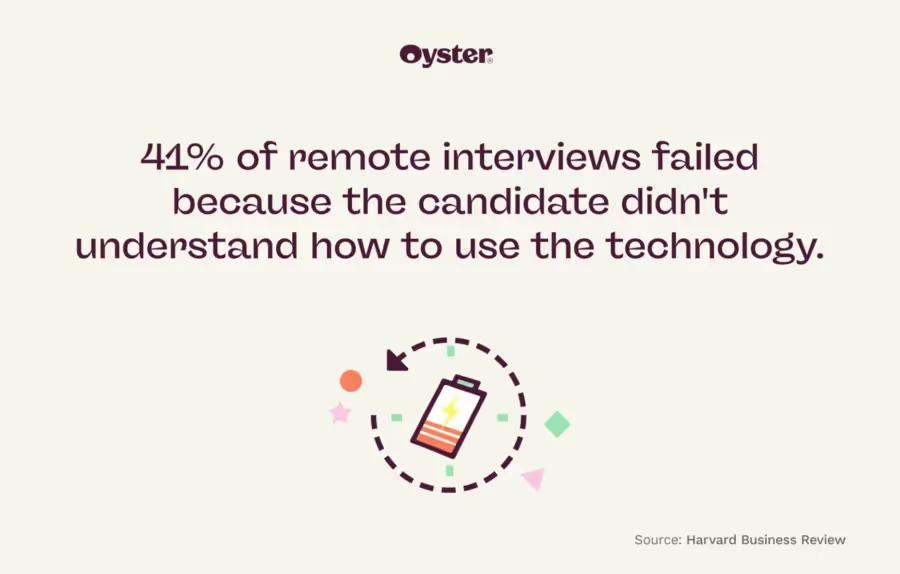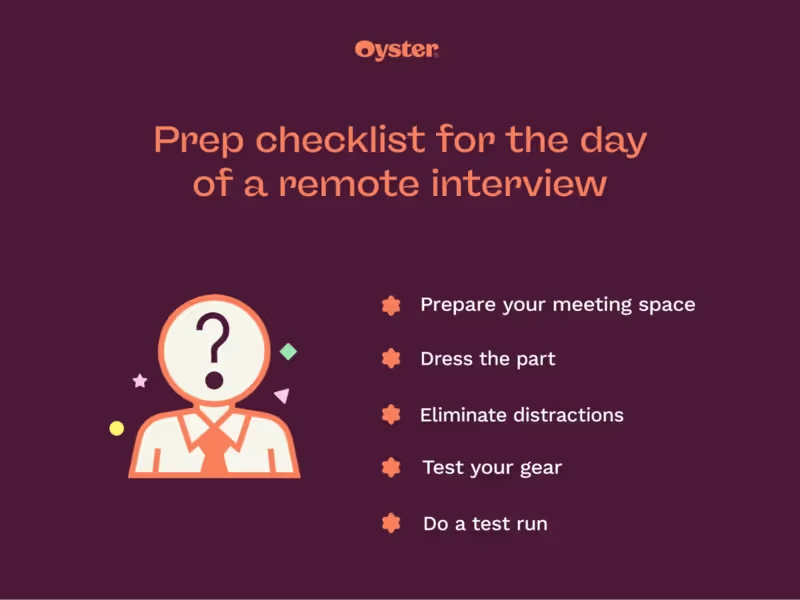Interviews can be nerve-wracking even for the most confident of people—and interviewing for a remote or distributed company is no different. While doing an interview in the comfort of your own home office takes some of the pressure off, there’s also a new set of considerations to keep in mind when interviewing from home.
In this post, we’re highlighting what you need to keep in mind to ace your next online interview.
Pro tip: Make a checklist of these tips, and tick them off as you apply each!
Before the interview

Here are some essentials to check off before the big day.
Confirm time zones
One big perk of remote work is accessing opportunities in different states or countries—geographic boundaries are not a barrier. However, your interviewers may be in a different time zone from you.
Some interviewers spell out their time zones when sending the interview invite, but others don’t. In the latter case, reach out and confirm—never assume everyone is in the same time zone as you.
Make sure you’re able to meet on the interviewer’s preferred platform
There are several different video-conferencing programs that most recruiters use for interviews—Skype, Zoom, Google Meet, WebEx, Microsoft Teams, etc.
In most cases, you defer to the recruiter's preferred platform. If it's impossible to use what they recommend-–for example, because it's not available for download in your area-–then contact the recruiter and tell them what will work instead.
If you've never used the interviewer's preferred software, make sure to download it and practice using it with a family member or a friend. Even if you've used it before, it's a good idea to go over it again.
Although it may seem minor, this is a crucial step in the process. In a Harvard Business Review study of remote interviews in 2020, 41% failed because the candidate didn't understand how to use the technology. In contrast, candidates who offered their interviewer tips for video call shortcuts made up 22% of all successful interviews.

Research the company and interviewer
This is an interview prep staple. The company wants to know if you're the right person for the job. And, of course, you want to know if the company is a good fit for you.
It's critical to learn everything you can about the company, including its products and services, corporate social responsibility efforts, and workplace culture. So spend some time looking over the company's website, as well as the LinkedIn profiles of its executives and your potential new coworkers.
This knowledge will help you demonstrate to the recruiter that you’re intentional about your application and genuinely understand the company’s mission. It can also give you an advantage when it comes to answering questions about how your contributions can help the company achieve its goals.
Practice
Online communication differs from face-to-face interaction in that you must learn where to look to make eye contact and then practice maintaining it. It can be tempting to look at yourself while speaking, but try to focus on looking into your camera.
Tip: Many video conferencing platforms offer the option to hide your self view while on a call. Try it! This will help you be more present during your interview and stress less about adjusting your appearance.
It’s a good idea to practice ahead of time to avoid any technical pitfalls. On Zoom and Google Meet you can even record your meetings and watch later to see what interviewing skills need improvement.
On the day of the interview

It's natural to feel nervous before any job interview, and a remote interview is no different. Even though you're in a familiar setting, you might run into some unexpected situations.
Here are some pre-game pointers to make sure everything goes smoothly.
Prepare your meeting space
You don’t have to give your place a makeover just because you have an interview. But you do want to make sure you can find a clean, clutter-free space to use as a backdrop. If you're going to use a virtual backdrop instead of a real one, go for something simple and professional, like a virtual office.
Next, find some good lighting. Ideally, you want to set up shop near a big window so you can catch some natural light. If you must use artificial lighting, choose a source that emits cool, white light and position it so that it illuminates your face and surroundings without casting any awkward shadows.
Finally, attach some notes, questions, or needed inspiration directly to the screen or the wall behind your camera. Keep these documents out of the interviewer’s sight but close enough to read.
Dress the part
The right outfit can help you get in the right frame of mind and make an excellent first impression. You may want to dress up even if you know it'll be a phone interview and the other person won't see you.
You never know when the interviewer will change from audio to video. At the very least, dressing up will put you in the interview mindset.
Eliminate distractions
If you’re interviewing from home, try to limit any interruptions from family members, pets, or roommates. Pick the quietest room in the house, and turn off any technology that might cause distractions or make noise—put your phone on silent and turn off the TV and any nearby appliances that emit white noise.
Closing doors and windows can prevent any whooshing breeze sound that may ruin your audio.
Test your gear
To prevent any last-minute surprises, test your gear before the interview begins. Use your webcam or phone for a trial run. Sit in the same position as you would during the interview and assess how you look and sound.
Pay attention to items in your environment and the noise they generate. For example, some fabrics make chafing sounds every time something rubs against them, which might create noise/distraction when you’re gesturing.
Do a test run
Some minutes before the interview, do a test run to make sure the app you’ll use doesn't need to be updated and you know how to work it.
Being technologically savvy is a sought-after skill among employers. If you don't do your homework to ensure that you're up to date, the hiring manager or interviewer may question whether you're the right candidate for the job.
During the interview
Once the interview begins, here are a few things to keep in mind to ensure you’re communicating clearly:
Look at the camera as much as possible
Most people are used to staring at their reflection on a video call. In remote interviews, you should try to mimic the body language you'd use in a physical interview as much as possible. And it all starts with making eye contact.
You want to be looking at the camera at the top center of your laptop screen, because this is as close as you can get to making eye contact with the interviewer. It also might help to you disable video mirroring so you aren’t tempted to look at yourself while speaking.
Speak clearly
There’s always a tiny chance of audio issues on a remote call, whether from your end or the interviewer’s. It’s important not to make communication more difficult by speaking inaudibly.
If you tend to stumble over your words, try to slow down so the other person can hear you. Communication abilities are in high demand, and demonstrating them is far preferable to simply listing them on your resume.
According to the 2020 GMAC Corporate Recruiters Survey, 69% of employers cite strong communication skills as a reason for hiring business school graduates.
Be mindful of your body language
A huge part of communication is nonverbal. Remote interviews limit body language, but you can demonstrate your active listening skills by smiling and nodding to show the interviewer you’re listening while they talk.
Try to sit upright, limit fidgeting, and answer your questions with poise. If you get an unexpected question, take time to collect your thoughts before answering.
Mute yourself on group calls
If more than one interviewer is on the call, mute yourself when you’re not speaking.
This shows you’re familiar with virtual meeting etiquette, which may count in your favor.
Be ready to talk about why you’d succeed in a remote role
Whether you’re interviewing for a temporary or permanent remote job, emphasize your remote-friendly skills. Many workers find it challenging to adapt to the new digital work environment, so if you have skills that set you apart, highlight them!
These include:
- Time management
- Computer skills
- Communication
- Self-motivation
Ask questions specific to remote working
There’s always an opportunity to ask questions about the company and the culture in an interview. But after a remote interview, chances are you’re going to have more questions than usual.
You want to be sure the company is a good fit for you as much as you are for them. So it’s crucial to ask questions that’ll shed more light on its policies and procedures.
Here are some examples:
- What communication and collaboration tools does the team use?
- How does the organization handle remote onboarding?
- Do employees get a budget for home office equipment?
- What’s the work culture like? What does the organization do to create cohesion?
- How does the organization determine local holidays for time off?
After the interview

Thank the interviewer
Within 24 hours of an interview, send a follow-up email. In it you can thank the interviewer for their time and let them know you're available if they have any additional questions. This can significantly impact how long you stick in the interviewer's mind.
You can contact the HR rep to get a list of your interviewers' emails if you don’t have them.
Note some key takeaways from the interview
This is especially important for the first interview, as its insights can be helpful in subsequent interviews.
Be patient
While it's a good idea to follow up with a thank you post-interview, don't stress if you don't get an update about next steps right away. Be patient and remember that hearing back might take time, but it’s all part of the process.
Go crush it!
Preparing for a remote job interview can feel daunting, but with this checklist you're up to the task. Plan everything ahead of time and work out any kinks before the interview.
Remember, your resume made it through the first round of screenings because you possess the qualifications and skills that the employer is looking for. The interview is a chance for the hiring manager to double-check your resume, get to know you a little better, and see if you'll fit into the company's culture.
So keep your chin up. Be confident. And don’t forget to inject as much personality as possible.
Looking for a new job and want more interview tips? Take our free Interview Skills course!
About Oyster
Oyster is a global employment platform designed to enable visionary HR leaders to find, hire, pay, manage, develop, and take care of a thriving distributed workforce. Oyster lets growing companies give valued international team members the experience they deserve, without the usual headaches and expense.
Oyster enables hiring anywhere in the world—with reliable, compliant payroll, and great local benefits and perks.





.avif)





.avif)


_Leader_Leader%201%20(2)%20(3).svg)
_Leader_UnitedKingdom_Leader%201%20(1).svg)
_Leader_Europe_Leader%201%20(1).svg)
_Leader_Mid-Market_Leader%201%20(1).svg)
_Leader_Small-Business_Europe_Leader%202%20(2).svg)
_Leader_Small-Business_Leader%201%20(1).svg)
_FastestImplementation_Small-Business_GoLiveTime%201%20(1)%20(1).svg)